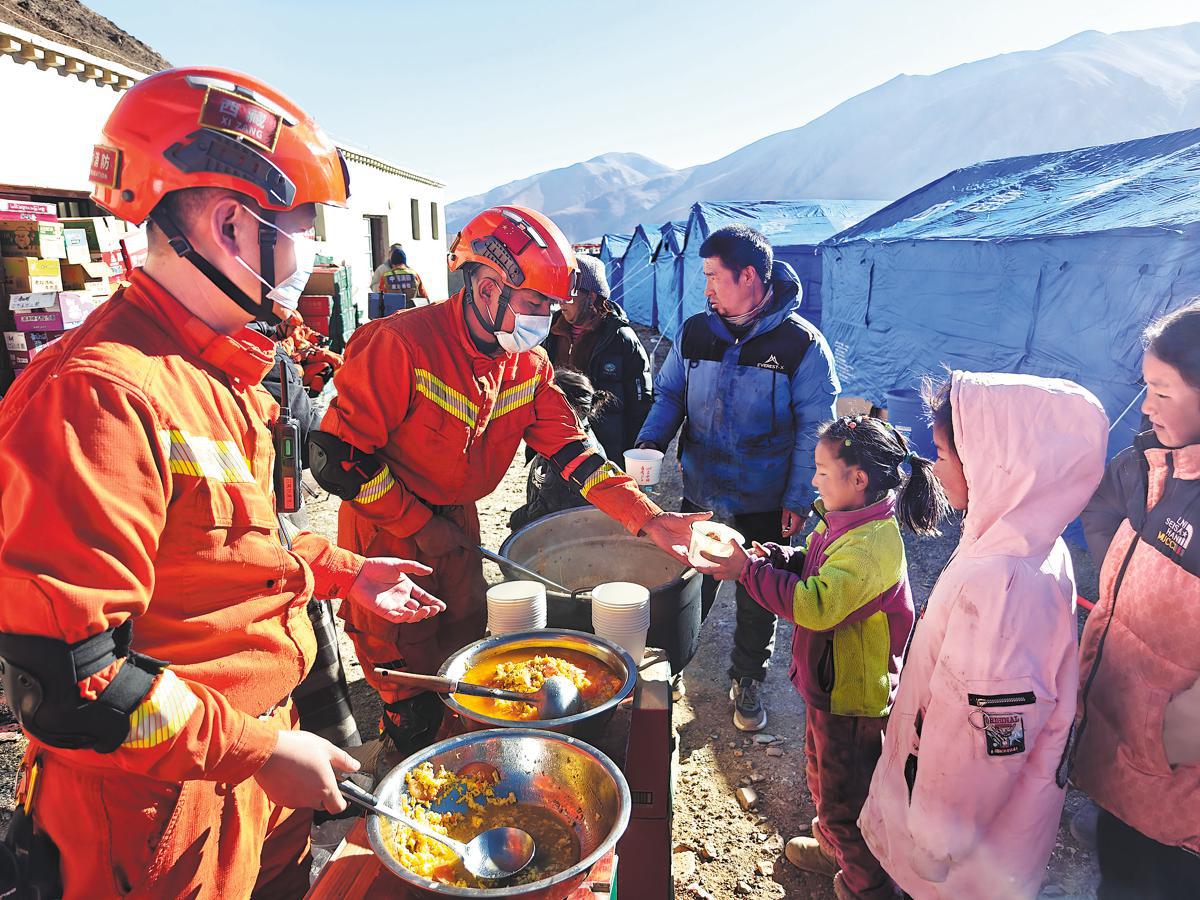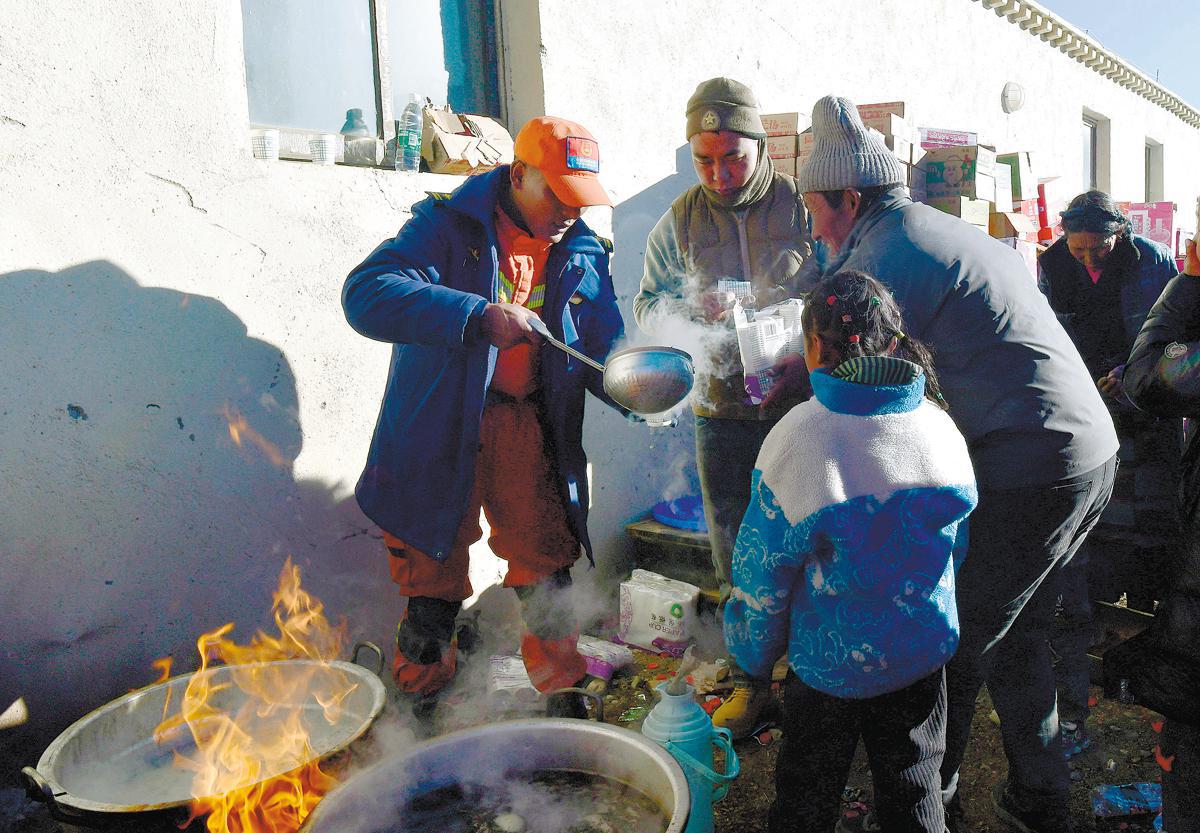
Members of the Xizang regional forest firefighting corps provide food on Wednesday for residents of a village in Dingri county, Xizang autonomous region. A total of 646 aftershocks were detected as of Wednesday noon after a magnitude 6.8 earthquake jolted the county on Tuesday morning, the regional government said. ZHENG LONG / FOR CHINA DAILY
Steam rising from pots simmering over fires and the cold breath of people huddled together in front of tents at -16 C gave the semblance of life returning to normal in Dingri on Wednesday, a day after the county in Shigatse, Xizang autonomous region, was struck by a magnitude 6.8 earthquake.
Children waited in line for a meal of eggs outside the temporary shelters, while older people tried to put to rest the memories of the disaster, which reduced more than 3,600 houses to rubble, claimed 126 lives and injured many more.
At a relief camp in Guring village in Dramso township, 55-year-old Sangye basked in the sun, holding a prayer wheel and chanting scriptures.
"Natural disasters can't be avoided. Although our house collapsed, my family was brought to a warm tent last night, and we were able to sleep," she said, thanking relief and rescue workers for their untiring efforts to resettle people.
Looking at a new stove her family received as part of relief efforts on Wednesday, Sangye added, "Tonight, we will be even warmer," as she folded her hands in gratitude.
Unfortunately, it was an uneasy night on Tuesday for Penba Norbu, deputy head of Dramso township. He recalled how he felt the strong shaking of his dormitory and noticed walls cracking before he ran outside. The township officials formed groups to check the villages.
When he arrived at Tsa village, Penba Norbu saw a child whose head was bleeding, some people with broken legs and those trapped under the debris of collapsed houses.
Six out of about 464 people living in the village died, but the others were rescued. When a series of aftershocks rocked the area, he sent out a notice on WeChat, reminding villagers to take care and report damage.
Penba Norbu said he felt relieved after the medical and rescue teams arrived, and the villagers were moved to temporary shelters. "There are enough tents and daily necessities. We can get through this," he added.
At a news conference held in Shigatse on Wednesday, Hong Li, director of Xizang Emergency Management Department, said about 12,000 people participated in the rescue and relief efforts, including public security personnel, the armed police, forest firefighters and the military. Together, they rescued 407 trapped individuals, he said.

A rescue worker serves sweet tea to earthquake-affected residents of Tsogo township in Shigatse, Southwest China's Xizang autonomous region, on Wednesday. The quake killed 126 people and left 188 others injured. LI LIN / CHINA NEWS SERVICE
A total of 187 relocation sites have been established in Dingri and 46,500 people have been moved. The 484 tourists who were visiting the county left the place as of Wednesday noon.
The relief tents are equipped with folding beds, cotton blankets, heaters, generators, stoves and emergency lighting, while people staying there have been provided with coats and warm footwear, besides food and medicine, the official said.
"The area is at a high altitude and is bitterly cold. We need to guarantee basic living conditions for the affected people, keep them warm and help them rebuild their homes as soon as possible," he added.
Hong said that 391 medical workers had been sent to help with the relief work. Among those severely injured, most have head injuries. Others have fractures. The critically injured people have been transferred to Shigatse People's Hospital.
Communication networks and power supplies in the affected area have been restored, he said, adding that the current disaster-relief work will be focused on relocating survivors and completing post-disaster reconstruction.
Tan Xiangdong, deputy director of the Xizang Health Commission, said at the news conference in Shigatse that doctors from Beijing, Shanghai, and Chengdu in Sichuan province have arrived in the region to treat those in critical condition.
Special teams have also arrived to test water quality, disinfect the environment and promote health awareness to prevent an epidemic, he added.
Meng Hui, deputy director of the Xizang Earthquake Agency, said that as of Wednesday noon, 646 aftershocks were recorded, with the strongest being of magnitude 4.4.
He did not rule out the possibility of more quakes of magnitude 5 to 6 over the next few days.